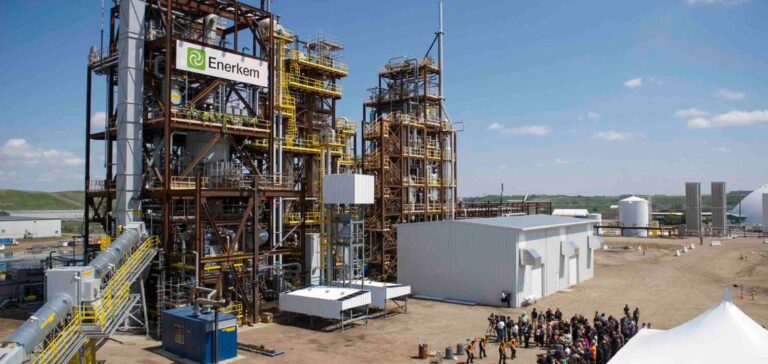Enerkem Inc. and Technip Energies have signed a memorandum of understanding to conclude a collaboration agreement. It aims to accelerate the deployment of Enerkem’s technology platform for biofuels and circular chemicals from non-recyclable waste.
Enerkem and Technip Energies join forces for green fuels from waste.
Enerkem specializes in the development and commercialization of its revolutionary gasification technology that transforms non-recyclable waste into biofuels, low-carbon fuels and circular chemicals, meeting the needs of hard-to-reduce sectors such as sustainable aviation and marine fuels.
Since 2016, Enerkem has been operating a commercial demonstration facility in Alberta, Canada. In addition, the company is currently involved in the development and construction of new commercial-scale methanol waste treatment facilities in Canada and Europe.
Technip Energies, which has successfully completed biofuels and low-carbon fuels projects worldwide, will contribute its expertise in engineering, technology integration and project implementation to support Enerkem’s projects. This partnership will improve Enerkem’s capacity and speed of project delivery. In addition, the collaboration will focus on strategic efforts to optimize design elements and industrialize the approach by replicating Enerkem’s designs for future projects.
Enerkem and Technip Energies: towards a cleaner energy future.
To accelerate the deployment of its technology, Enerkem intends to create a development company (DevCo). DevCo’s objective is to acquire sites and obtain relevant permits for the replicable design of the methanol biorefinery, supporting the production of biofuels and low-carbon fuels, as well as circular chemicals.
Dominique Boies, CEO of Enerkem, said: “We are delighted to partner with Technip Energies to accelerate the deployment of Enerkem’s technology in Europe, North America and the Middle East. Technip Energies’ extensive expertise will enable Enerkem’s customers to benefit from the speed-to-market and cost efficiency of the projects, supporting their decarbonization efforts and sustainability goals.”
Bhaskar Patel, SVP Sustainable Fuels, Chemicals and Circularity at Technip Energies, said, “We are pleased to partner with Enerkem in the deployment of its technology platform to convert waste into sustainable and valuable end products such as biofuels. By leveraging our expertise in engineering, sustainable chemistry and biofuel projects, we will support the project execution and deployment of Enerkem’s technology.”
Enerkem expands its global influence with sustainable biorefinery projects.
Founded in 2000, Enerkem develops and commercializes its revolutionary gasification technology, which transforms non-recyclable waste into biofuels, low-carbon fuels and circular chemicals for hard-to-dispose-of sectors, including sustainable aviation and marine fuels. Its solution addresses both the challenges of waste management and fossil fuel dependency, while contributing to the development of a circular economy for a sustainable, carbon-neutral future.
Headquartered in Montreal, Enerkem employs close to 300 people in Canada, the United States, Europe and the United Kingdom, and has various projects around the world, including the world’s first commercial biorefinery producing advanced bio-methanol and circular methanol from recyclable waste in Alberta, Canada.
In partnership with key strategic partners, a large-scale facility based on Enerkem’s waste-to-methanol platform is under construction in Quebec, Canada, and is scheduled to come on stream in 2025. In Tarragona, Spain, Enerkem’s technology is at the heart of the Ecoplanta project, which will produce biomethane and circular methanol from non-recyclable waste.






















